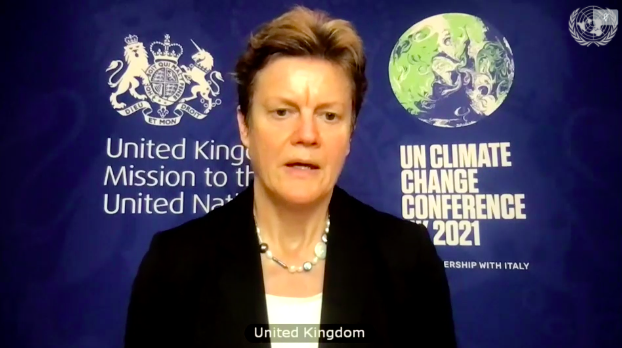Tackling chemical weapons in Syria through both OPCW and UNSC
Statement by Ambassador Barbara Woodward, UK Permanent Representative to the UN, at the Security Council

I would like to congratulate Tunisia on assuming the Presidency and also as other colleagues have done, to welcome new members of the Security Council from India, Ireland, Kenya, Mexico and Norway.
I would like also to thank Under-Secretary-General Nakamitsu for her briefing today. We would also like to reiterate our gratitude to the Director-General of the OPCW for attending and briefing the Security Council last month. As recognised by the Security Council in resolution 2118 and subsequent resolutions, ongoing coordination between the UN and the OPCW is vital if we are to collectively resolve this issue.
At this point, I’d also like to reiterate our confidence in the OPCW and its Technical Secretariat. I recall that only a year ago, this Council adopted a Presidential Statement which unanimously reaffirmed our strong support for the work of the OPCW. Just five weeks ago, the overwhelming majority of states, parties from across all regional groups voted in favour of the OPCW budget, which included renewed funding for the IIT and other Technical Secretariat teams working on Syria.
I thank the OPCW Director-General for his 87th monthly report. In December 2013, the Security Council unanimously decided that Syria should not use, develop, produce, otherwise acquire, stockpile or retain chemical weapons, and should comply with all aspects of the decision of the OPCW Executive Council of 27 September 2013, which required it to submit a declaration of its chemical weapons programme within 30 days. It is deeply regrettable that 7 years later, Syria’s 30-day declaration can still not be considered accurate and complete.
As we have discussed previously, the unresolved issues in Syria’s chemical weapons declaration are of a serious and substantive nature. They include the unaccounted-for whereabouts of thousands of munitions and hundreds of tonnes of chemical agents. As the Director-General reported last month and again this month, they include a facility which Syria previously declared as not having been used for chemical weapons production but which OPCW evidence collected since 2014 indicates was used for the production and/or weaponization of chemical warfare nerve agents.
The ongoing threat posed to international peace and security by these unresolved issues is not hypothetical. Since Syria allegedly destroyed all of its chemical weapons stockpile in 2014, it has been found by both the OPCW-UN Joint Investigative Mechanism and the OPCW Investigation and Identification Team to have used chemical weapons on at least 6 occasions. These are not hypothetical issues for the thousands of Syrian civilians who have suffered the horrifying effects on the body of nerve agents and chlorine.
As we said last month, the fact that three of the unresolved issues have recently been closed, shows that, contrary to the assertions of some that they are artificial, they are eminently capable of resolution if Syria chooses to engage genuinely and constructively.
Mr President, there is increasing international concern about Syria’s ongoing failure to comply with its obligations under the Chemical Weapons Convention, and the consequent threat to international peace and security and the chemical weapons non-proliferation regime. This is reflected in the recent decision taken by the OPCW Executive Council, which set a further deadline for compliance by Syria and recommended that the Conference of States Parties take action if Syria did not comply. Following failure to meet that deadline, the Conference of States Parties will consider that action this Spring.
As I said earlier, it has always been recognised that elimination of the Syrian chemical weapons programme has to be tackled through concerted efforts of both the OPCW and Security Council.
As we enter the 8th year of our consideration of this matter and as new colleagues join us on the Council, we look forward to renewing a serious and constructive discussion about the action the Security Council should take to uphold its resolutions and tackle this serious threat to international peace and security.